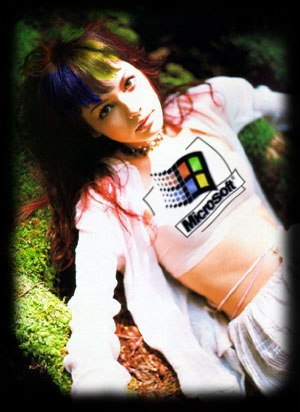Microsoft Office source code
“Their are no spelling errors on you're document. Not to bad!”
– Clippy
“It seems thar r 2 mutch spellin errors; do u wants 2 preform an automatd spellcheck?”
– Beat Box Kitteh on Microsoft Office
“Word. That's for writin' letterz and shit, yo.”
– Fifty Cent (or was it Buck Sixty-Five?) on Microsoft Word
Microsoft Office Source Code has been kept secret since its inception. But it's not the kind of secret like the "finger lickin' good" chicken; or how they got the caramel in the Caramilk bar. It's more like the kind of secret where you have a son or daughter that have a chronic nose-picking habit, and you just make them hide in their rooms until the guests go away.
The Secret is in the Spaghetti[edit | edit source]
The predominant coding technique behind MSO source code is called "sphaghetti coding". It is a technique where the creation of a computer program is driven by Jolt Cola (mixed with a bit of vodka) and potato chips. Where others would write an algorithm followed by coding pieces of the program, spaghetti coders would write a "bunch of code", compile it, curse at themselves that it didn't work the first time, then write a bunch more code thinking that the mistakes in what was added later would cancel out the mistakes of what was added earlier.
There are no functions or subroutines in spaghetti code, in fact, there is a total absence of any modularity whatsoever. You just keep adding lines of code until the program is finished. The last line of the code should always be a LONGJMP statement to redirect to the first line of the program. Sometimes this was mistaken for the first line of the operating system, which would cause the system to reboot. After a million lines of spaghetti code, no one knows where those errors are anymore.
MS Office as Obfuscated C Code[edit | edit source]
There has been a push to make the MSO source code public in recent years, driven by MS insiders who would like to enter the source code in this year's Obfuscated C Code Contest [1]. They believe they stand a good chance of winning, and they are confident that their code is so incomprehensible and indecipherabe that no trade secrets will ever be divulged to competitors.
Clippy[edit | edit source]
Clippy is annoying animated paperclip which pesters you for attention during times you are thinking about what to write in your document. It is likely that the paper clip has attention-seeking issues. He defeats his own object in the end, since the user just feels like killing it.
That sales predominate despite clippy's existence is an example of marketing genius rather than any merit of program designers. People have been able to get rid of Clippy by going through a thicket of menus, and a battery of permission settings and registry edits in recent years. Of course, that is going about it the long way. The simpler way to get rid of Clippy is to un-install Office and install Open Office.
The Code (Top Secret!)[edit | edit source]
It has already been stated that there are millions of lines of spaghetti code which make up MS Office, which is the only office product that is truly compatible with the spaghetti code that make up the Windows operating system. The code below was written by one of their senior programmers, a 30 year-old former script kiddie, which makes up the core of the MSO codebase. This code calls a lot of external routines written by more junior staff.
#include <iostream.h>
#include <vengeance.h>
#include <world/domination.h>
#include <monopoly.h>
#include <evil.h>
#include <office.h>
#include <clippy.h>
#include <annoying.h>
#define USER_FRIENDLY NULL
int main(argc,argv)
{
while (!CRASHED)
{
initialize();
open_document(argv);
do_nothing_loop();
popup_clippy(clippy_quotes[rand(0,666)]);
if (save_button_is_pressed())
{
popup_clippy("Word is about to crash. There is no chance of saving your document.");
popup_clippy("Would you like to play a game?", "Yes", "No");
}
if (new_document_is_pressed())
{
stuff_hard_drive(66666);
wait(6666);
create_new_document();
}
if (key_pressed)
{
popup_clippy("It seems you are typing, need some help??");
}
if (quit())
{
popup_clippy("Don't go! I want to play with you!!!");
return 0;
}
}
return CRASHED;
}

